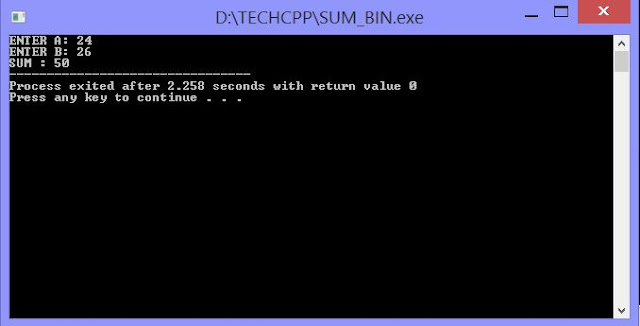EXPLANATION
Let the two numbers a and b be 3 and 2. These numbers are represented in binary as:
b = carry << 1
b = 0 1 0 << 1
b = 1 0 0
ITERATION 2
I. Calculate carry (carry = a & b)
a: 0 0 1
b: 1 0 0
_____
0 0 0
II. Calculate sum (a = a ^ b)
a: 0 0 1
b: 1 0 0
_____
1 0 1
III. Update the value of b (b = carry << 1)
b = carry << 1
b = 0 0 0 << 1
b = 0 0 0
Since, b has become 0, the calculation stops and leads us with sum as 1 0 1(5).
PROGRAM
// Program to calculate sum of two numbers without using arithmetic operator
#include <iostream>
using namespace std;
int main()
{
int a,b,carry;
cout<<"ENTER A: ";
cin>>a;
cout<<"ENTER B: ";
cin>>b;
while (b != 0)
{
carry = (a & b) ;
a = a^b;
b = carry << 1;
}
cout<<"SUM : "<<a;
return 0;
}
OUTPUT
Let the two numbers a and b be 3 and 2. These numbers are represented in binary as:
3 = 011
2 = 010
ITERATION 1
I. Calculate carry (carry = a & b)
a: 0 1 1
b: 0 1 0
_____
0 1 0
0 1 0
II. Calculate sum (a = a ^ b) (XOR operation)
a: 0 1 1
b: 0 1 0
_____
0 0 1
0 0 1
III. Update the value of b (b = carry << 1)
b = carry << 1
b = 0 1 0 << 1
b = 1 0 0
ITERATION 2
I. Calculate carry (carry = a & b)
a: 0 0 1
b: 1 0 0
_____
0 0 0
II. Calculate sum (a = a ^ b)
a: 0 0 1
b: 1 0 0
_____
1 0 1
III. Update the value of b (b = carry << 1)
b = carry << 1
b = 0 0 0 << 1
b = 0 0 0
Since, b has become 0, the calculation stops and leads us with sum as 1 0 1(5).
PROGRAM
// Program to calculate sum of two numbers without using arithmetic operator
#include <iostream>
using namespace std;
int main()
{
int a,b,carry;
cout<<"ENTER A: ";
cin>>a;
cout<<"ENTER B: ";
cin>>b;
while (b != 0)
{
carry = (a & b) ;
a = a^b;
b = carry << 1;
}
cout<<"SUM : "<<a;
return 0;
}
OUTPUT

